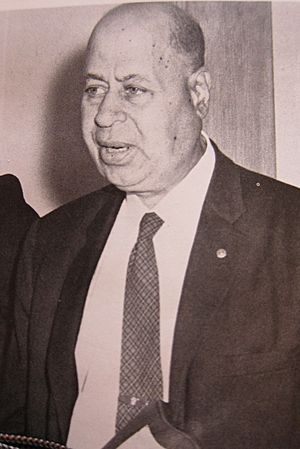Frank Erdman Boston facts for kids
Quick facts for kids
Frank Erdman Boston
|
|
|---|---|
| Born | March 10, 1890 |
| Died | February 8, 1960 (aged 69) |
| Education | Lincoln University Medico Chirurgical College (1915) |
| Occupation | physician |
| Employer | Roosevelt Hospital Mercy Hospital |
| Title | |
| Parent(s) | Charles A. Boston Julia Sands |
| Relatives | Edgar Boston (brother) Mae Boston (sister), S. Clifford Boston (brother) |
Frank Erdman Boston (born March 10, 1890 – died February 8, 1960) was an American doctor. He worked in Philadelphia and Lansdale, Pennsylvania.
Dr. Boston served in World War I as a medical officer. He started as a captain and later became a major. After the war, he continued his medical work. He helped create an ambulance service and founded the North Penn Hospital in Lansdale.
Contents
Early Life and Education
Frank Boston was born in Philadelphia, Pennsylvania, on March 10, 1890. His parents were Charles A. Boston and Julia Sands. He was the youngest of three children, with an older brother named Edgar and an older sister named Mae.
Frank grew up and went to school in Philadelphia. He then attended Lincoln University. After college, he studied medicine at Medico Chirurgical College. He finished his medical studies in 1915. By 1916, he was certified as a surgeon. Dr. Boston began his career as an intern at Roosevelt Hospital.
Early in his career, Dr. Boston faced a challenge. A young boy with a serious head injury was brought to the hospital. The hospital did not have an X-ray machine. Dr. Boston drove the boy to another hospital for an X-ray. Sadly, the child did not survive. Dr. Boston explained that he and his team did their best with the tools they had. He said they would not have moved the child if they had an X-ray machine at their own hospital.
Later, Dr. Boston became a surgeon at Mercy Hospital. He also had his own private medical practice in Philadelphia. He even opened a medical office in Lansdale.
Military Service in World War I
In 1917, the United States joined World War I. Many African Americans wanted to join the military. However, the U.S. Army was not ready for a large war. There were only four black regiments, and many commanders did not want black and white soldiers in the same units. Also, some leaders doubted the fighting skills of black soldiers.
A special training school opened for African-American officers. This was at Fort Des Moines Provisional Army Officer Training School. It opened because many African Americans volunteered.
When Dr. Boston joined the military as a doctor, he was made a First Lieutenant. Like other African-American recruits, he went to Fort Des Moines for medical training. After his training, Lieutenant Boston became a medical officer. He was assigned to the 317th Engineers Regiment of the 92nd Division.
Before going to France, Lieutenant Boston spent more time at Camp Sherman, Ohio. His skills were so good that he was promoted to Captain.
In France, Captain Boston had a lot of work to do. Many African-American soldiers were assigned to engineering units. These units did hard and dangerous jobs. They dug trenches, built roads, and created defenses against the Germans. Captain Boston worked hard to care for sick and injured soldiers. This was especially true in late 1918, when German attacks became more intense. He showed great skill as a surgeon.
After the war ended, Captain Boston stayed in the Medical Reserve Corps. He even exchanged letters with the famous author W.E.B Du Bois. Du Bois was writing a book about the experiences of African-American soldiers in World War I. He wanted to learn from Captain Boston and others. Through these conversations, Du Bois learned about the racism that was common in the U.S. Army. He noted that African Americans were often discouraged from joining. Their achievements were also not recognized as much as those of white soldiers.
In 1919, Dr. Boston was promoted to the rank of Major. He was also a member of the Association of Military Surgeons. Major Boston left the military later in 1919.
Medical Career and Community Work
After leaving the military, Major Boston returned to Philadelphia. He continued his medical practice there. He strongly believed in providing medical help and education to the community. He was a member of several important medical groups. These included the American Medical Association and the National Medical Association.
In 1926, Dr. Boston was a leader for surgeons at a big medical meeting. He also helped open special operating rooms at Mercy Hospital for well-known surgeons.
Dr. Boston often helped with fundraisers for veterans. He dedicated much time to the Veterans of Foreign Wars. In 1934, he opened a hospital in Lansdale. It was first called Elm Terrace Hospital. In 1954, it was renamed North Penn Hospital. Today, it is known as Lansdale Abington Hospital. Dr. Boston also continued his work at Mercy Hospital in the 1930s. He gave many medical talks there.
Dr. Boston also started a First Aid Emergency Squad in Lansdale. This group is now called the Volunteer Medical Services Corps (VMSC). He spent many hours helping this important service grow.
Later Life and Legacy
Frank Boston never married.
In 1960, Dr. Boston passed away at age 69. Many of his friends and colleagues from the hospital and the Emergency Relief Squad attended his funeral. He was buried in Whitemarsh Cemetery in Pennsylvania.
The First Baptist Church in Lansdale created a memorial for him. It is a sculpture by S.K. Miller. You can see it today at 7th & Broad Streets in Lansdale. On June 8, 2022, the state of Pennsylvania honored him. They named part of State Route 2004 in Lansdale and Hatfield the Dr. Frank Erdman Boston Memorial Highway.
 | Leon Lynch |
 | Milton P. Webster |
 | Ferdinand Smith |


